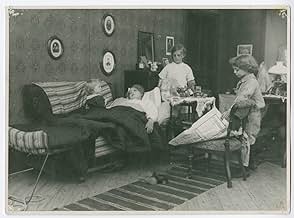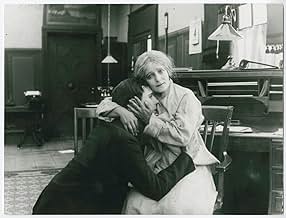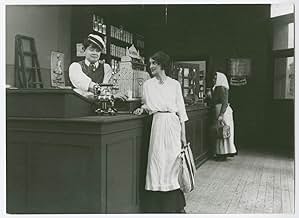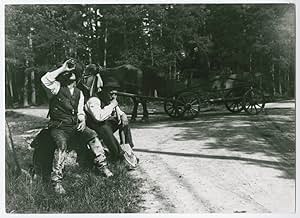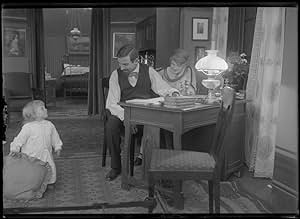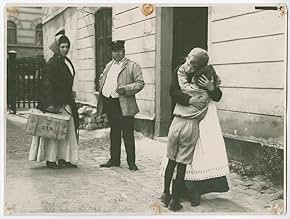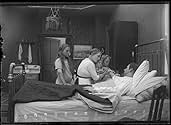IMDb RATING
7.0/10
1.6K
YOUR RATING
Financial struggles separate a single mother from her children.Financial struggles separate a single mother from her children.Financial struggles separate a single mother from her children.
- Director
- Writers
- Stars
- Director
- Writers
- All cast & crew
- Production, box office & more at IMDbPro
Featured reviews
In conjunction with its release of THE OUTLAW AND HIS WIFE, Kino has also given us this splendid double bill from Victor Sjostrom (Seastrom in America) who was truly one of the world's great directors. His influence on other Scandinavian filmmakers (Ingmar Bergman and Carl Theodor Dreyer to name two of the best known) is clearly evident although with INGEBORG HOLM (1913) you could say he influenced many others as well. This film is incredibly well made for a film of its vintage. Although the camerawork is first rate it's the restrained naturalistic style of the acting by star Hilda Borgstrom along with the seriousness of the thematic material that really makes you sit up and take notice.
D. W. Griffith had explored social themes in his Biograph shorts before this but never in a feature length film and similar socially concious movies like TRAFFIC IN SOULS (also 1913) were not as dramatically sophisticated. The story of a widow whose husband leaves her bankrupt and is forced to live in a workhouse where she must give up her children to foster parents, works as both social indictment and dramatic tragedy. It's hard to watch this film and not become emotionally involved in the plight of the title character. The score by David Drazin is simple but effective using primarily piano with a few synthesized strings.
The other film on the disc, A MAN THERE WAS, dates from 1917 and is based on an epic poem (TERJE VIGEN) from the great Norwegian dramatist Henrik Ibsen (PEER GYNT). The English title cards are even an approximation of his poetic writing style which may be tough going for some but they add quite a bit to the visual narrative. Full of lots of natural location shooting including the open sea, MAN explores a variety of powerful emotions as a fisherman during the Napoleonic Wars is wrongfully imprisoned which results in the death of his family.
Many years after his release he is presented with the opportunity of saving the family of the man who sent him to prison. Donald Sosin's piano score is very effective especially during the sea sequences but it would have been nice to have a chamber or orchestral score to accompany the film. Nevertheless this is an important set from one of the great early film pioneers and as such should not be missed...For more reviews visit The Capsule Critic.
D. W. Griffith had explored social themes in his Biograph shorts before this but never in a feature length film and similar socially concious movies like TRAFFIC IN SOULS (also 1913) were not as dramatically sophisticated. The story of a widow whose husband leaves her bankrupt and is forced to live in a workhouse where she must give up her children to foster parents, works as both social indictment and dramatic tragedy. It's hard to watch this film and not become emotionally involved in the plight of the title character. The score by David Drazin is simple but effective using primarily piano with a few synthesized strings.
The other film on the disc, A MAN THERE WAS, dates from 1917 and is based on an epic poem (TERJE VIGEN) from the great Norwegian dramatist Henrik Ibsen (PEER GYNT). The English title cards are even an approximation of his poetic writing style which may be tough going for some but they add quite a bit to the visual narrative. Full of lots of natural location shooting including the open sea, MAN explores a variety of powerful emotions as a fisherman during the Napoleonic Wars is wrongfully imprisoned which results in the death of his family.
Many years after his release he is presented with the opportunity of saving the family of the man who sent him to prison. Donald Sosin's piano score is very effective especially during the sea sequences but it would have been nice to have a chamber or orchestral score to accompany the film. Nevertheless this is an important set from one of the great early film pioneers and as such should not be missed...For more reviews visit The Capsule Critic.
10mmipyle
Over the weekend I watched "Ingeborg Holm" (1913), directed by Victor Sjöström, and starring Hilda Borgström as Ingeborg. This early Swedish feature is 96 minutes long, and it has recently been released by Kino Video. I must admit that the film rather astonished me because of the quality of pacing, of acting, of story - nearly everything; others from this year and before that were anything near a feature length, for the most part, are exceedingly antiquated by modern standards. "Ingeborg Holm" is anything BUT antiquated. I recently watched "Terje Vigen" (1917), also directed by Sjöström, and was riveted from beginning to end. It made me want to see more of his work. This became available to me, and I eagerly watched it. It certainly didn't disappoint. The story concerns what were called "workhouses" in Scandinavia. It begins by showing Ingeborg Holm's husband, through diligence and good economic behavior, being able to begin to operate his own grocery store. Unfortunately, just after opening, the husband suffers a hemorrhage and dies. Ingeborg takes over the running, but unfortunately, through the untoward grafting of an employee she ends up bankrupt. She and her three children are left with a choice to take 20 kronor a month or for Ingeborg to go work in a workhouse. She chooses the latter. I won't give away all the plot, but you can be sure that she suffers the incredible inhumanity that was inherent in that system at the time. It is said that this film nearly single-handedly began an improvement in the social system of Sweden.
I can't say enough nice things about this film because the comparison that most Americans will make will be with D. W. Griffith. Griffith only compares in a few shorts by 1913, maybe "Female of the Species", and others like it. But his next year's (1914) "Judith of Bethulia" doesn't begin to compare favorably with "Ingeborg Holm". "Ingeborg Holm"'s pacing is superb, its plot line developed as many feature silents wouldn't be for years yet. The acting has moments of early histrionic style, but for the most part it is remarkably realistic and measured. The film could bring tears to some. For me, it was a wonder to behold such an early film with such high quality.
The lead is Hilda Borgström. There were moments, especially near the end, where her eyes kept reminding me of Bette Davis. Those who have seen "Whatever Happened to Baby Jane?" will see the eye comparison immediately! Also, the man who plays the Poorhouse Superintendent, Georg Grönroos, looks so much like the American President, Theodore Roosevelt, as to be uncanny. His habit of taking off and putting on his reading glasses is so similar as to make one wonder if he wasn't copying Roosevelt. Anyway, it was nearly unnerving at times! One more note: the film, as with many of the period, is divided into acts, each act obviously following the length of a reel. At the end of each reel there is considerable nitrate deterioration. At the end of the picture there is massive deterioration, but still not enough to not be able to follow the picture. Overall, the quality is first rate, the picture usually quite good, if not excellent. If you're a fan of silent film, especially early silents, and if you like social drama, this is an outstanding way to quickly go through 96 minutes!
I can't say enough nice things about this film because the comparison that most Americans will make will be with D. W. Griffith. Griffith only compares in a few shorts by 1913, maybe "Female of the Species", and others like it. But his next year's (1914) "Judith of Bethulia" doesn't begin to compare favorably with "Ingeborg Holm". "Ingeborg Holm"'s pacing is superb, its plot line developed as many feature silents wouldn't be for years yet. The acting has moments of early histrionic style, but for the most part it is remarkably realistic and measured. The film could bring tears to some. For me, it was a wonder to behold such an early film with such high quality.
The lead is Hilda Borgström. There were moments, especially near the end, where her eyes kept reminding me of Bette Davis. Those who have seen "Whatever Happened to Baby Jane?" will see the eye comparison immediately! Also, the man who plays the Poorhouse Superintendent, Georg Grönroos, looks so much like the American President, Theodore Roosevelt, as to be uncanny. His habit of taking off and putting on his reading glasses is so similar as to make one wonder if he wasn't copying Roosevelt. Anyway, it was nearly unnerving at times! One more note: the film, as with many of the period, is divided into acts, each act obviously following the length of a reel. At the end of each reel there is considerable nitrate deterioration. At the end of the picture there is massive deterioration, but still not enough to not be able to follow the picture. Overall, the quality is first rate, the picture usually quite good, if not excellent. If you're a fan of silent film, especially early silents, and if you like social drama, this is an outstanding way to quickly go through 96 minutes!
The Holms are a happy Swedish family who live an easy bourgeoisie life. In order to further improve their living, Herr Sven Holm requests a line of credit in the amount of 10.000 kronor in order to open a grocery shop.
Unfortunately things will change drastically for the Holms when Herr Sven falls ill with tuberculosis and dies. The grocery store, in the meanwhile, was left improperly unattended by an employee. Frau Ingeborg Holm is left bankrupt and alone with her three small children. This forces her to ask for help in a poorhouse.
Sweden has contributed to mankind some debatable inventions. For example, there's the safe but unstylish tank automobiles made in that Northern country ( nothing in common with elegant "Hispano-Suiza" cars )... or.. that modernen and consequently, ugly furniture manufactured in pieces that the buyer must to try to assemble ( ah, the "Rococo" overloaded style! ) ...or ...with not a trace of a four string quartets, the Swedish instead tormented aristocracy with bands of four longhaired youngsters singing tunes that even today are popular among commoners But certainly the most important Swedish contribution to the whole world was Social Security for their population via a program that provides protection to their commoners with unemployment insurance, poverty protection and pensions, among others. It's a public welfare state that other countries will model years later.
But unfortunately things weren't always that way as Herr Victor Sjöström depicted in his early silent film "Ingeborg Holm", directed by the Swedish director in the silent year of 1913.
The film was based on a play by Herr Nils Krok, who can be seen posing as the film starts in an elegant old photograph ( nothing in common with the coloured ones that the youngsters put in their modernen profiles ). The picture version tells the human tragedy of Frau Ingeborg Holm, who due to circumstances and the blows of fate, will face destitution. Her personal drama is worsened by the unsympathetic and strict poorhouse rules that during the last centuries were applied by Swedish officialdom.
Herr Sjöström admirably depicts the process of loss that affects Frau Holm's life and her desperation, abandonment, helplessness and finally insanity. It's a terrible sad odyssey that Frau Holm will suffer and includes making heartbreaking decisions such as when she is forced to put her children in an orphanage.
Certainly "Ingeborg Holm" is not an easy film. It is an uncomfortable drama in which Herr Sjöström denounces in a realistic and harsh way the injustice caused by strict central government laws that have no concern for their subjects.
Such bitterer sensations continue during the whole film climaxing at the end of the picture when Frau Holm, after 15 years, reunites again with one of her sons. This is a wonderful scene full of infinite sadness and very moving ( at this point it must be said that the original music score composed and performed by Herr David Drazin for the longhaired "Kino" modernen disc edition, is absolutely touching and elegant ).
But this is not a happy ending because there is no comfort in this reunion; there is not a chance in recovering the happy old days when times were better for Frau Holm and her three children. Instead Frau Holm has lived a miserable life in where everything she had and loved was destroyed. Herr Sjöström depicts a desperate, hard and moving portrait of a ruined life.
And now, if you'll allow me, I must temporarily take my leave because this German Count must pay a visit to his aristocratic fostered parents.
Unfortunately things will change drastically for the Holms when Herr Sven falls ill with tuberculosis and dies. The grocery store, in the meanwhile, was left improperly unattended by an employee. Frau Ingeborg Holm is left bankrupt and alone with her three small children. This forces her to ask for help in a poorhouse.
Sweden has contributed to mankind some debatable inventions. For example, there's the safe but unstylish tank automobiles made in that Northern country ( nothing in common with elegant "Hispano-Suiza" cars )... or.. that modernen and consequently, ugly furniture manufactured in pieces that the buyer must to try to assemble ( ah, the "Rococo" overloaded style! ) ...or ...with not a trace of a four string quartets, the Swedish instead tormented aristocracy with bands of four longhaired youngsters singing tunes that even today are popular among commoners But certainly the most important Swedish contribution to the whole world was Social Security for their population via a program that provides protection to their commoners with unemployment insurance, poverty protection and pensions, among others. It's a public welfare state that other countries will model years later.
But unfortunately things weren't always that way as Herr Victor Sjöström depicted in his early silent film "Ingeborg Holm", directed by the Swedish director in the silent year of 1913.
The film was based on a play by Herr Nils Krok, who can be seen posing as the film starts in an elegant old photograph ( nothing in common with the coloured ones that the youngsters put in their modernen profiles ). The picture version tells the human tragedy of Frau Ingeborg Holm, who due to circumstances and the blows of fate, will face destitution. Her personal drama is worsened by the unsympathetic and strict poorhouse rules that during the last centuries were applied by Swedish officialdom.
Herr Sjöström admirably depicts the process of loss that affects Frau Holm's life and her desperation, abandonment, helplessness and finally insanity. It's a terrible sad odyssey that Frau Holm will suffer and includes making heartbreaking decisions such as when she is forced to put her children in an orphanage.
Certainly "Ingeborg Holm" is not an easy film. It is an uncomfortable drama in which Herr Sjöström denounces in a realistic and harsh way the injustice caused by strict central government laws that have no concern for their subjects.
Such bitterer sensations continue during the whole film climaxing at the end of the picture when Frau Holm, after 15 years, reunites again with one of her sons. This is a wonderful scene full of infinite sadness and very moving ( at this point it must be said that the original music score composed and performed by Herr David Drazin for the longhaired "Kino" modernen disc edition, is absolutely touching and elegant ).
But this is not a happy ending because there is no comfort in this reunion; there is not a chance in recovering the happy old days when times were better for Frau Holm and her three children. Instead Frau Holm has lived a miserable life in where everything she had and loved was destroyed. Herr Sjöström depicts a desperate, hard and moving portrait of a ruined life.
And now, if you'll allow me, I must temporarily take my leave because this German Count must pay a visit to his aristocratic fostered parents.
I dont know if netflix got involved before or after the restoration .but this a great achievement for1913 may be I'm a wimp but the end made me cry. More like this netflix please
Ingeborg Holm / Margaret Day (1913) :
Brief Review -
Master Victor Sjöström's Swedish Melodrama is one of the earliest notable works about a mother's Tragedy in the cinema world. I am a big fan of Victor Sjöström and his prominent classics from the 1920s decade. It gives me an immense pleasure to view his early films, which were made on basic formulas as per the requirements and understanding of the era. Ingeborg Holm forced me to think about all the films based on Mother's tale, and I quickly realised how influential it was. It was much before Chinese cinema made "SheNu" / "The Goddess" (1934) and Indian cinema made the classic "Aurat" (1940). However, Holm's story is not that broad. It sticks to the basics while dealing with a relatable and emotional topic like motherhood. When I tried to find out the similarities between this film and other ones, I found the Marathi film "Chimni Pakhare" close to it, but then the main character had to go through different conflicts. The best close answer was the Telugu flick, "Jeevana Jyothi" (1975), which also had a double role boost. Imagine, a film from the 1910s decade influencing modern well-known films. The film is about a mother with three children who had to send her children to foster homes due to the financial crisis after her husband's death. The insanity angle is also used well by mixing it with high-end melodrama. I remember Hilda Borgström from Victor's "The Phantom Carriage" (1921), but today I noticed that her face and expressions are familiar with those of Lillian Gish. Her face kept reminding me of Gish, who also happened to work during the same period of time. Victor Sjöström's film has everything to make a classy watch, but it missed the classic tag by just an inch, in my opinion. Nevertheless, a great work from the early stages of movies that set many iconic formulas once and for all.
RATING - 7.5/10*
By - #samthebestest.
Master Victor Sjöström's Swedish Melodrama is one of the earliest notable works about a mother's Tragedy in the cinema world. I am a big fan of Victor Sjöström and his prominent classics from the 1920s decade. It gives me an immense pleasure to view his early films, which were made on basic formulas as per the requirements and understanding of the era. Ingeborg Holm forced me to think about all the films based on Mother's tale, and I quickly realised how influential it was. It was much before Chinese cinema made "SheNu" / "The Goddess" (1934) and Indian cinema made the classic "Aurat" (1940). However, Holm's story is not that broad. It sticks to the basics while dealing with a relatable and emotional topic like motherhood. When I tried to find out the similarities between this film and other ones, I found the Marathi film "Chimni Pakhare" close to it, but then the main character had to go through different conflicts. The best close answer was the Telugu flick, "Jeevana Jyothi" (1975), which also had a double role boost. Imagine, a film from the 1910s decade influencing modern well-known films. The film is about a mother with three children who had to send her children to foster homes due to the financial crisis after her husband's death. The insanity angle is also used well by mixing it with high-end melodrama. I remember Hilda Borgström from Victor's "The Phantom Carriage" (1921), but today I noticed that her face and expressions are familiar with those of Lillian Gish. Her face kept reminding me of Gish, who also happened to work during the same period of time. Victor Sjöström's film has everything to make a classy watch, but it missed the classic tag by just an inch, in my opinion. Nevertheless, a great work from the early stages of movies that set many iconic formulas once and for all.
RATING - 7.5/10*
By - #samthebestest.
Did you know
- TriviaNoted as the first true narrative film, its remarkable narrative continuity would characterize the style now known as classical Hollywood, which dominated the global film industry for the majority of the century.
- ConnectionsFeatured in Victor Sjöström - ett porträtt av Gösta Werner (1981)
Details
- Runtime
- 1h 36m(96 min)
- Sound mix
- Aspect ratio
- 1.33 : 1
Contribute to this page
Suggest an edit or add missing content

